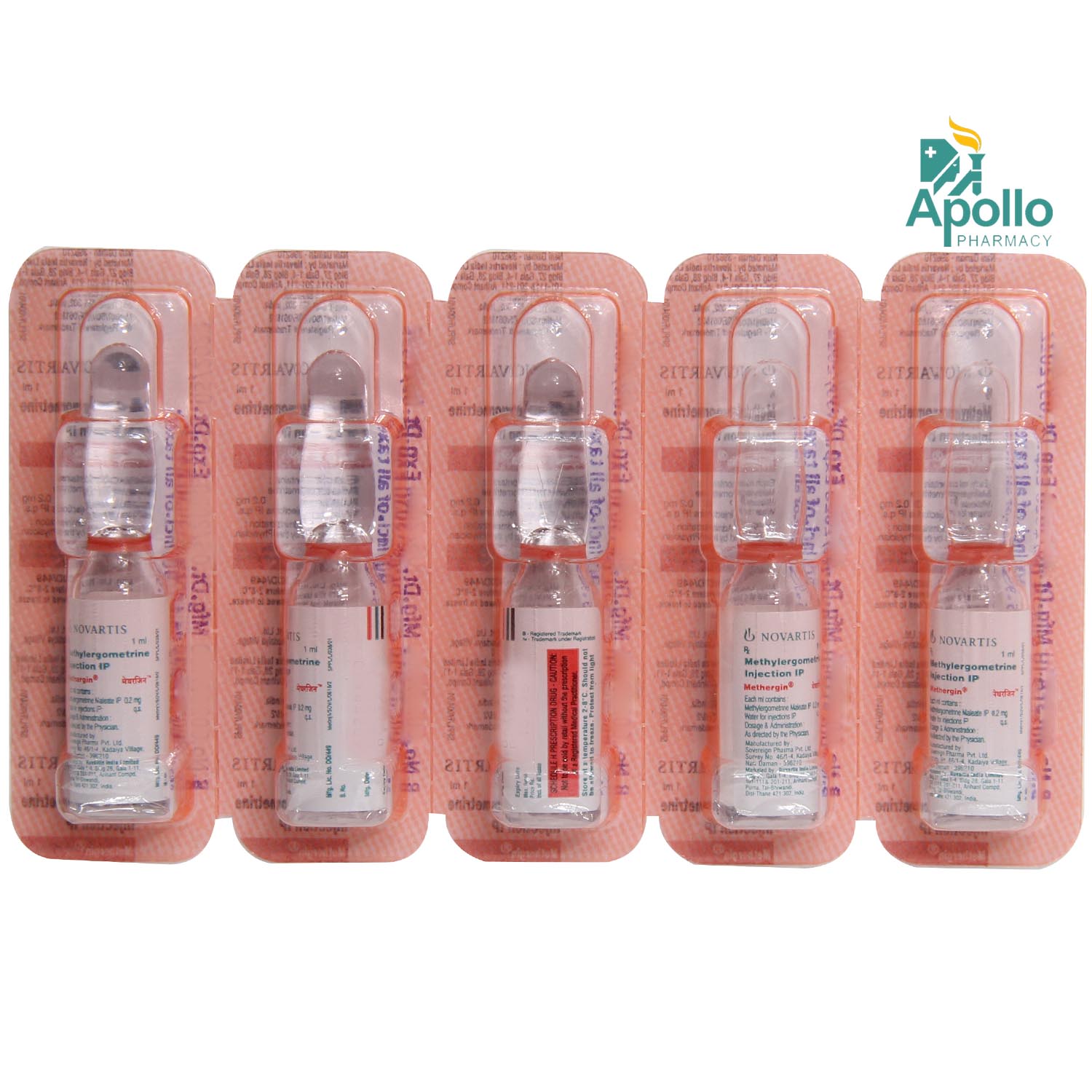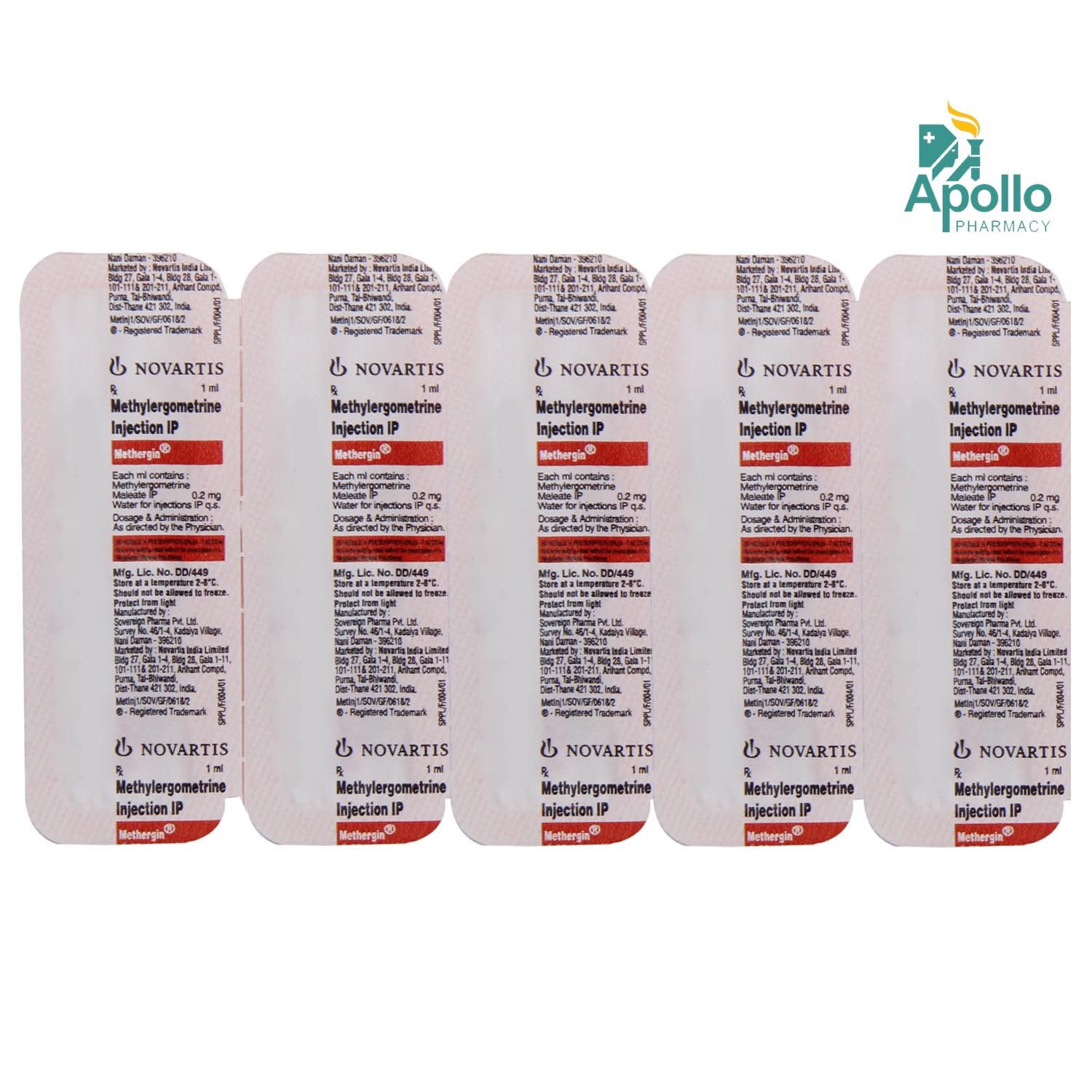Methergin Injection 1's
MRP ₹15.5
(Inclusive of all Taxes)
₹1.9 Cashback (12%)
Provide Delivery Location
Online payment accepted
 Prescription drug
Prescription drugWhats That
Composition :
Manufacturer/Marketer :
Consume Type :
Expires on or after :
Return Policy :
NPPA :
About Methergin Injection
Methergin Injection belongs to the class of medication called 'ergot alkaloids' or 'uterotonic' primarily used to prevent and stop heavy bleeding (postpartum-third stage of labour bleeding) after childbirth or after a miscarriage in cesarean section. Besides this, it is also used to improve uterine contraction (antepartum) and produce uterine contraction during the third stage of labor (postpartum). Postpartum haemorrhage is heavy bleeding (more than normal) after the birth of the baby.
Methergin Injection contains a semi-synthetic ergot alkaloid 'Methylergometrine', that stimulates uterine muscles and increases the uterus' contractions, thus reducing blood loss. It also increases the effects of a natural substance called prostaglandins (PGs), increasing contractions and producing labour. As a result, these increased uterine contractions help in the child's delivery and substantially reduce excessive uterine bleeding.
Methergin Injection will be administered by a healthcare professional. Do not self-administer. The most common side effects of Methergin Injection are nausea, vomiting, stomach pain, and mild headache in some cases. Most of these side effects of Methergin Injection do not require medical attention and gradually resolve over time. However, if the side effects are persistent, reach out to your doctor.
If you ever had surgery on the uterus, cesarean, or premature labour, please inform your doctor to avoid any complications. If you have been given prostaglandins, then do not take Methergin Injection; if both medicines are taken together, it can increase the contractions. Methergin Injection should not be used for a prolonged time if the contractions do not increase or have severe pre-eclamptic toxemia (high blood pressure, protein in the urine, and swelling), blood or heart circulation problem.
Uses of Methergin Injection
Directions for Use
Key Benefits
Methergin Injection contains a semi-synthetic ergot alkaloid 'Methylergometrine' primarily used to stop heavy bleeding postpartum, i.e. third stage of labour bleeding after childbirth or after a miscarriage in cesarean section. Additionally, it plays a significant role in birth by increasing uterus contractions and inducing labour in pregnant women. Methergin Injection works by stimulating uterine muscles and expanding the uterus' contractions, thus reducing blood loss. It also increases the effects of a natural substance called prostaglandins (PGs), increases the contraction,s and hence induces labour. As a result, these increased uterine contractions help deliver the child and substantially reduce excessive uterine bleeding.
Storage
- Stress levels should be managed by practicing yoga and meditation regularly.
- Maintain a proper sleeping schedule.
- Maintain a balanced diet containing low glycemic index like fruits, vegetables, proteins and grains.
- Do not consume alcohol.
- Hydrate your body: Drink enough water to prevent dehydration and headaches.
- Calm Your Mind: Deep breathing and meditation can help you relax and relieve stress.
- Rest and Recharge: Sleep for 7-8 hours to reduce headache triggers.
- Take rest: lie down in a quiet, dark environment.
- Cold or warm compresses can help reduce tension.
- Stay Upright: Maintain good posture to keep symptoms from getting worse.
- To treat headaches naturally, try acupuncture or massage therapy.
- Over-the-counter pain relievers include acetaminophen and ibuprofen.
- Prescription Assistance: Speak with your doctor about more substantial drug alternatives.
- Severe Headaches: Seek emergency medical assistance for sudden, severe headaches.
- Frequent Headaches: If you get reoccurring headaches, consult your doctor.
- Headaches with Symptoms: Seek medical attention if your headaches include fever, disorientation, or weakness.
Drug Warnings
Do not take Methergin Injection if you are allergic to Methergin Injection or any of its ingredients. Increasing the dose of Methergin Injection can be harmful if your womb already has too strong contractions, any obstructions in the pathway that might prevent the delivery or if the baby is not receiving a sufficient oxygen supply. Also, the use of Methergin Injection is not advisable if the baby is wrongly positioned in the birth canal, the baby’s head is too large to fit through the pelvis, the placenta lies near the neck of the womb, the placenta separates from the womb before birth, the womb is over-extended and likely to tear (in case you are carrying more than one baby). If you have been given prostaglandins, do not use Methergin Injection within 6 hours as both medications, if taken together, can increase the contractions. Methergin Injection should not be used for a prolonged time if the contractions do not increase or if you have severe pre-eclamptic toxaemia (high blood pressure, protein in the urine, and swelling) or blood or heart circulation problems.
Drug-Drug Interactions
Drug-Drug Interactions
Login/Sign Up
Coadministration of Methergin Injection with Glyceryl trinitrate can increase the levels and side effects of Methergin Injection.
How to manage the interaction:
Taking Methergin Injection with Glyceryl trinitrate is generally avoided as it can possibly result in an interaction, it can be taken if your doctor has advised it. However, if you experience sudden dizziness, lightheadedness, headache, fainting, shortness of breath, or rapid heartbeat, contact your doctor immediately. Do not discontinue any medications without first consulting your doctor. Do not discontinue any medications without first consulting your doctor.
Coadministration of Methergin Injection with Voriconazole may increase the blood level of Methergin Injection.
How to manage the interaction:
Although Methergin Injection with Voriconazole can cause an interaction, they can be taken if prescribed by a doctor. Do not discontinue any medication without consulting a doctor.
Taking Methergin Injection with Ritonavir can significantly increase the blood levels and effects of Methergin Injection.
How to manage the interaction:
Taking Methergin Injection with Ritonavir is not recommended, but can be taken together if prescribed by a doctor. In case you experience any side effects like severe abdominal discomfort, nausea, vomiting, tingling or numbness, weakness or pain in the muscles, pale skin, blue or purple discoloration on fingers or toes, tightness or pain in the chest, irregular heartbeat, intense headache, breathing difficulties, confusion, or slurred speech, consult a doctor. Do not discontinue any medications without consulting a doctor.
Coadministration of Sumatriptan with Methergin Injection can reduce the blood flow and increase the risk of high blood pressure or heart-related problems.
How to manage the interaction:
Taking Sumatriptan with Methergin Injection together can possibly result in an interaction, it can be taken if your doctor has advised it. However, if you notice any symptoms like sudden dizziness, lightheadedness, fainting, shortness of breath, or rapid heartbeat, contact your doctor immediately. Do not discontinue any medications without first consulting your doctor.
Using Ketoconazole with Methergin Injection can increase the concentration of Methergin Injection, which may lead to side effects.
How to manage the interaction:
Taking Ketoconazole with Methergin Injection is not recommended as it can cause an interaction, but it can be taken if prescribed by the doctor. Do not discontinue any medication without consulting a doctor.
When Methergin Injection is taken with Clarithromycin, the amount of Methergin Injection in the blood can go up. This can increase the risk or severity of side effects.
How to manage the interaction:
Taking Clarithromycin with Methergin Injection is generally avoided as it can lead to an interaction, it can be taken only when advised by a doctor. Do not stop using any medications without a doctor's advice.
Co-administration of Methergin Injection and Itraconazole may increase the blood levels of Methergin Injection.
How to manage the interaction:
Methergin Injection and itraconazole may interact, but if prescribed by a doctor, they can be used together. Do not discontinue any medications without first consulting your doctor.
Taking Ephedrine with Methergin Injection may lead to an increase in the risk of high blood pressure.
How to manage the interaction:
Although taking Ephedrine with Methergin Injection may lead to an interaction, it can be taken if prescribed by the doctor. It is advised to maintain your blood pressure. Do not discontinue any medications without a doctor's advice.
Taking Phenylephrine with Methergin Injection can led to side effects like increased blood pressure.
How to manage the interaction:
Taking Phenylephrine with Methergin Injection can lead to an interaction but can be taken if prescribed by the doctor. It is advised to monitor your blood pressure regularly. Do not discontinue any medications without a doctor's advice.
Drug-Food Interactions
Drug-Food Interactions
Login/Sign Up
Grapefruit Juice, Grapefruit
How to manage the interaction:
Consumption of Methergin Injection with Grapefruit and Grapefruit may lead to an increase in the effectiveness of Methergin Injection. Avoid or limit grapefruit and grapefruit juice consumption with Methergin Injection. This can increase the risk or severity of side effects.
Diet & Lifestyle Advise
- Long walks can help to relieve stress, keep your body strong, and help in easy delivery.
- Please take a little bit of Castrol oil as it is known to stimulate prostaglandin, which ripens the cervix and get labor started.
- Some food like dates, raspberry tea leaves are known to ripen the cervix and get labor started.
- Acupressure also stimulates labor and helps in delivery.
Side Effects of Methergin Injection
- Nausea
- Vomiting
- Headache
- Stomach pain
Habit Forming
Therapeutic Class
All Substitutes & Brand Comparisons
RX
Out of StockErmeg 0.2mg Injection
Alembic Pharmaceuticals Ltd
₹3.21
(₹2.89/ 1ml)
78% CHEAPERRX
Out of StockMethyler 0.2mg Injection
Biochem Pharmaceutical Industries Ltd
₹4.37
(₹3.93 per unit)
71% CHEAPERRX
Out of StockWergomet 0.2mg Injection
Wockhardt Ltd
₹4.87
(₹4.38/ 1ml)
67% CHEAPER
Drug-Diseases Interactions
Drug-Diseases Interactions
Login/Sign Up
FAQs
Drug-Drug Interactions Checker List
- PROSTAGLANDINS
- DESFLURANE
- CYCLOPROPANE
- DOPAMINE
- EPINEPHRINE
- HALOTHANE
- ONDANSETRON
- VASOPRESSIN
- SEVOFLURANE
Special Advise
- Methergin Injection when given for induction of labor, stimulation of labor and prevention of vaginal bleeding after delivery of the baby especially after caesarean surgery. It must be administered only by the intravenous (IV) or intramuscular (IM) route under medical supervision in a hospital setting only.
Disease/Condition Glossary
Postpartum haemorrhage: It is a serious but rare condition which causes excessive vaginal bleeding within one day after giving birth to the child. It happens mostly in cases of cesarean birth. When a baby is delivered, the uterus of the body contracts and forces out the placenta. After the placenta's delivery, these contractions put pressure on the bleeding vessels at the place where the placenta was attached, resulting in vaginal bleeding. It is normal to lose some amount of blood after delivery, but if a woman is losing more blood than normal, it can be dangerous.

Have a query?
Alcohol
Safe if prescribed
It is not known if alcohol affects Methergin Injection. Consult your doctor.
Pregnancy
Consult your doctor
Methergin Injection is not recommended for use during pregnancy.
Breast Feeding
Consult your doctor
It is advised to avoid breastfeeding for at least 12 hours after taking Methergin Injection as this medicine may pass into breast milk and can harm a nursing baby.
Driving
Safe if prescribed
Avoid driving and operating machinery.
Liver
Consult your doctor
Methergin Injection is not known to show any interaction in liver disease.
Kidney
Consult your doctor
Methergin Injection to be taken with caution, especially if you have a history of kidney diseases/conditions. The dose will be adjusted by your doctor.
Children
Safe if prescribed
Methergin Injection is not recommended for children below the age of 18 years. The safety and effectiveness of Methergin Injection have not been established in children.









